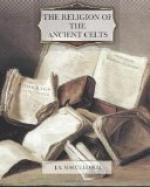Merlin, or Myrddin, appears in the romances as a great magician who is finally overcome by the Lady of the Lake, and is in Geoffrey son of a mysterious invisible personage who visits a woman, and, finally taking human shape, begets Merlin. As a son who never had a father he is chosen as the foundation sacrifice for Vortigern’s tower by his magicians, but he confutes them and shows why the tower can never be built, namely, because of the dragons in the pool beneath it. Then follow his prophecies regarding the dragons and the future of the country, and the story of his removal of the Giant’s Dance, or Stonehenge, from Ireland to its present site—an aetiological myth explaining the origin of the great stone circle. His description of how the giants used the water with which they washed the stones for the cure of sickness or wounds, probably points to some ritual for healing in connection with these megaliths. Finally, we hear of his transformation of the lovelorn Uther and of his confidant Ulfin, as well as of himself.[438] Here he appears as little more than an ideal magician, possibly an old god, like the Irish “god of Druidism,” to whose legend had been attached a story of supernatural conception. Professor Rh[^y]s regards him as a Celtic Zeus or as the sun, because late legends tell of his disappearance in a glass house into the sea. The glass house is the expanse of light travelling with the sun (Merlin), while the Lady of the Lake who comes daily to solace Merlin in his enchanted prison is a dawn-goddess. Stonehenge was probably a temple of this Celtic Zeus “whose late legendary self we have in Merlin."[439] Such late romantic episodes and an aetiological myth can hardly be regarded as affording safe basis for these views, and their mythological interpretation is more than doubtful. The sun is never prisoner of the dawn as Merlin is of Viviane. Merlin and his glass house disappear for ever, but the sun reappears every morning. Even the most poetic mythology must conform in some degree to actual phenomena, but this cannot be said of the systems of mythological interpretation. If Merlin belongs to the pagan period at all, he was probably an ideal magician or god of magicians, prominent, perhaps, in the Arthur saga as in the later romances, and credited with a mysterious origin and an equally mysterious ending, the latter described in many different ways.
The boastful Kei of the romances appears already in Kulhwych, while in Geoffrey he is Arthur’s seneschal.[440] Nobler traits are his in later Welsh poetry; he is a mighty warrior, fighting even against a hundred, though his powers as a toper are also great. Here, too, his death is lamented.[441] He may thus have been a god of war, and his battle-fury may be poetically described in a curious passage referring to him in Kulhwych: “His breath lasted nine days and nine nights under water. He could remain without sleep for the same period. No physician could heal a wound inflicted by his sword.




